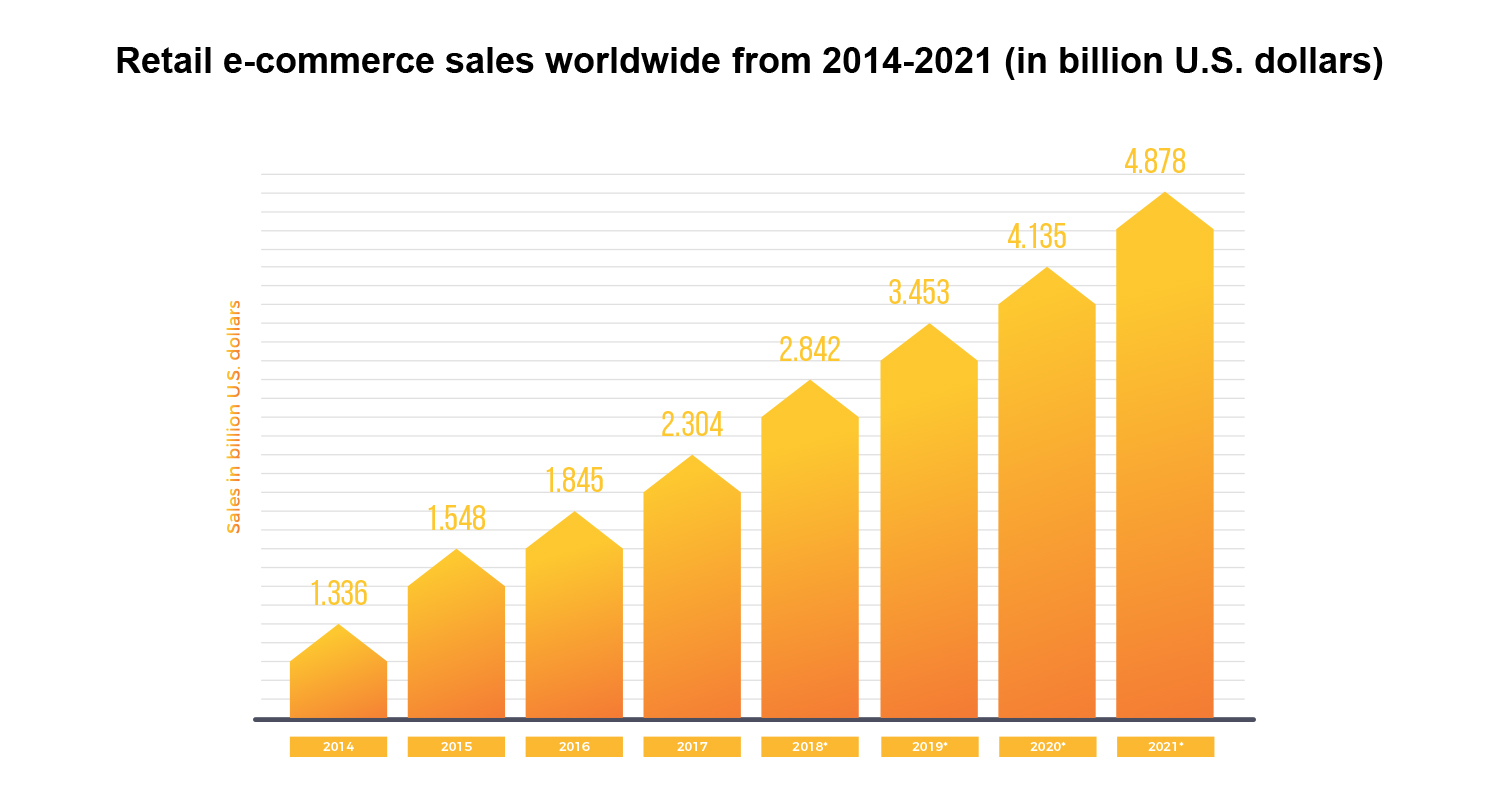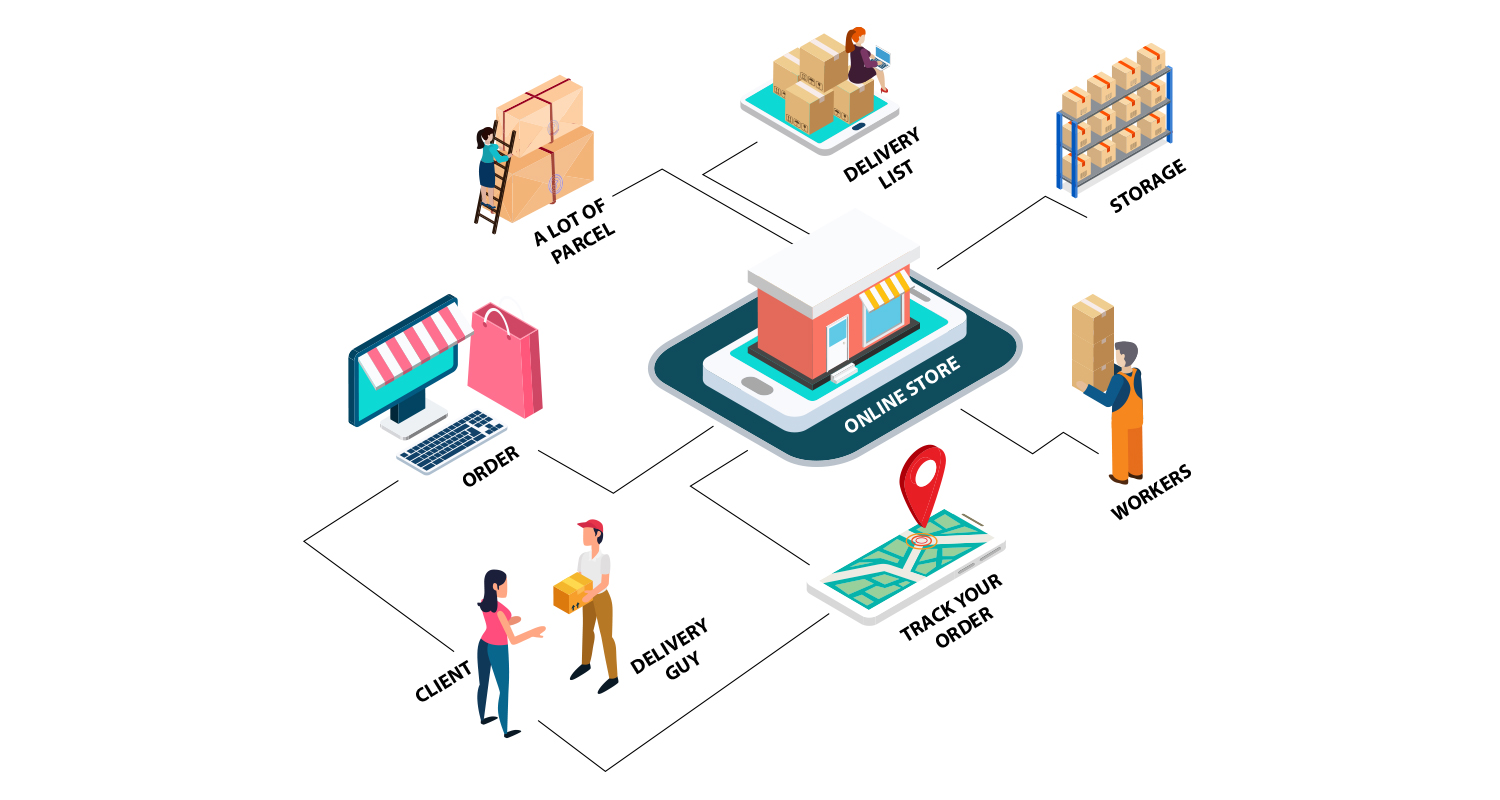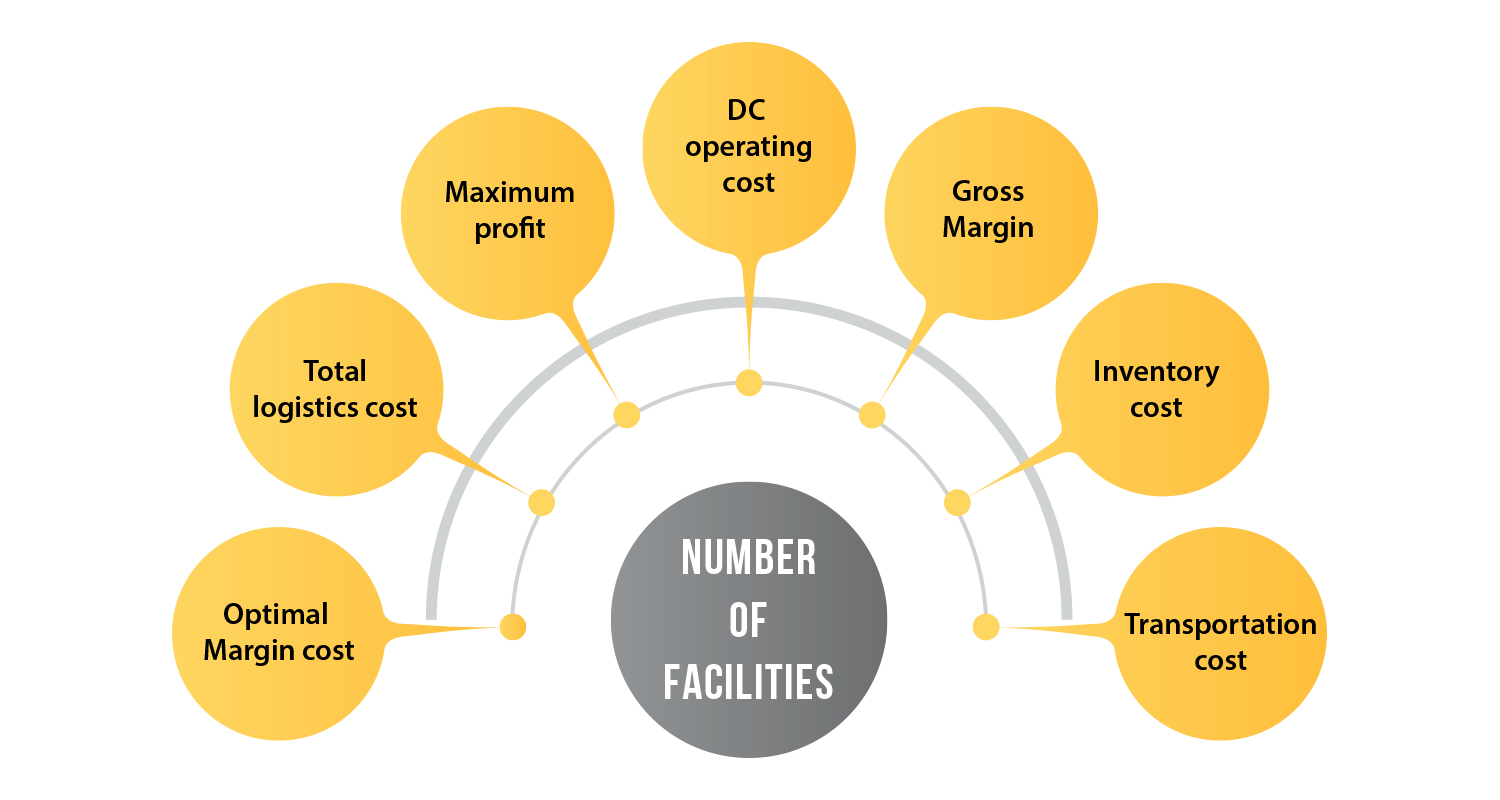Thanks to the demand of fast paced and swift delivery and scalability to meet increasing demands, modern eCommerce supply chain management system went through rigorous technology changes. Not every other eCommerce app is as big and swift as Amazon but all of them strive to compete with the undisputed eCommerce leader by leveraging latest technology solutions.
Today, to meet the standards of modern supply chain management, the elementary growth lies in efficient product lifecycle management and re-arranging the flow of products with customized eCommerce development and logistics solutions.
It is for customers to make a purchase through mobile and with the rapid rise in such activities the mobile sales of eCommerce around the world are expected to raise 4878 million dollars by the end of 2021.
The rising trend of mobile eCommerce demands an active approach and uniqueness from retailers around the globe to fit the required current trend. However, the business constraint that shatters the growth of most retailers is supply chain optimization.
So, before focusing on the role of new technologies in bringing a fresh life to the modern eCommerce, we need to see the challenges faced by the supply chain management of eCommerce stores.
Challenges In Current eCommerce Supply Chain Management
For supply chain managers of the present-day eCommerce stores are continuing to mount up. Maintaining efficiency, remaining effective and making value addition to the customer satisfaction still remained big challenges. As an increasing number of businesses are turning towards eCommerce app development services for having their own online store, the supply chain and logistics became the key competitive area for most businesses across the niches.
Let’s have a look at the key challenges faced by the eCommerce supply chain management systems all over the world.
Customer Service
Customer service is at the center of all challenges faced by supply chain management systems worldwide. Supplying the right product with right quantity at the right place and time remains to be the biggest challenge.
The solution is not easy at all. Simply because of the variety of customer needs it is all the more difficult. With increasing focus on personalization, the variety is continuing to scale up making things more complicated.
Another important aspect is about informing the customers. Today, customers are more acquainted with visible information that can be accessed effortlessly without asking for. Communicating the product and delivery information at the right time and context is another challenge for supply chain management systems.
Cost Competitiveness
As commodity prices continue to rise all over the world and as consumers are often constrained by various lifestyle factors that continue to make living cost higher, shipping cost is something that every consumer considers as an additional burden.
On the other hand, top eCommerce app development companies and logistics service providers find it extremely hard to remain cost-competitive because of the rising transport cost, cost for new technologies and customization drive to meet the demands of the end-user.
Risk Management
The world is a lot closer and connected now. Apart from the promise and benefits of this connected world, it comes with a lot of new challenges. Unlike the earlier times, the world is full of eventful and unpredictable in terms of political outcomes, economic crises, new market dynamics, consumer demands and credibility of institutions. In simple way to express, we are vulnerable and exposed to risks more than ever before.
Supply chain dealing with global and local transport systems, regulations, economic and administrative norms and constraints and diverse consumer demands is most exposed to risks and volatility than many other industries.
Relationship Management
For supply chain processes to run smoothly and without contradiction, it is important for the suppliers and partners to have mutual agreement on standards of performance and evaluation. When the parameters on both parts are in sync, more business opportunities and scopes of improvement are created.
Human Capital
Getting talented human capital for supply chain management processes is becoming extremely difficult now. Since the eCommerce supply chain and associated technologies are still new to the market, there is not enough talent pool with relevant expertise, skills and experience to deal with the latest challenges in modern supply chain management.
The Need For Evolved Supply Chain Management
The evolution in supply chain management process majorly depends on the factor of enabling multiple stores rather than relying on one single depot. This will help you to speed up the delivery process, ultimately helping you to win the cut-throat competition. Technology is the critical solution in enabling this process.
The way now all components in a supply chain are working in unison and helping to deliver a positive experience to the customers at the receiving end, could not be possible without the technology boon. The entire coordination starting from the manufacturers to the vendors to the service providers has become fully transformed through connected technologies. eCommerce platforms have come as the great pool of resources aggregating all these components and their respective advantages. Several top Magento brands make the best examples of the power of eCommerce platforms. These top eCommerce brands utilize the logistic app development solution with cross-department functional integration to optimize the complete supply chain process – from raw materials to same day delivery.
Some of the key benefits that eCommerce technologies contributed towards customer satisfaction from a supply chain management system include the following.
- Flexible order cut-off time
- Fast-paced order fulfilment
- Quick processing of order
- Reducing overhead cost and expediting fees through fast order processing
- Decreased inventory cost
- More efficient warehousing through storage and space utilization
- Enhanced warehousing capacity
Understanding about the benefits offered by an optimized system makes the need of custom supply chain management system a necessity. So, how to begin the implementation?
The Implementation Of Optimizing Supply-Chain Process
The primary method in optimizing and developing a modern supply system is to map out the current traditional supply network. In order to do this, you need to understand the number of facilities you want to deliver, the constraints involved in delivery costs and more.
As shown in the above image, you should have enough data to analyze and develop an efficient system.
Map out the Supply Network
To map out the entire network of your supply chain in details, you need to source a lot of valuable data concerning different components and processes. You need to gather the following information.
- SKU to customer flow
- Distribution and order fulfilment cost
- Components like order size, staff, capacities, etc.
- Characteristics of the internal and external fleet
- Location data and how it’s transmitted to the SKU
- Inventory tracking with SKU location
- Turnaround time for shipping
All these data together will help an eCommerce logistics to map their service efficiently and improvements where it’s needed.
Technology Solutions
Now that we have a clear idea of the challenges faced by eCommerce supply chain management and the benefits of latest eCommerce technologies in curbing these challenges, we need to have a look at the key technology solutions that are being utilised by leading eCommerce companies for supply chain management.
Let’s briefly explain the technology solutions.
Meeting Demands for Same-Day Delivery
As customers are impatient more than ever before thanks to instant access to contents and services right from their handheld device screen, meeting the demands for same-day delivery is key to the success of many eCommerce logistics.
To ensure same-day delivery without any delay and error, the eCommerce supply chains can utilise latest technologies such as effective route planning based on artificial intelligence and Machine Learning.
Maintaining Cost-Competitiveness
For logistics companies it is extremely important to stay competitive on cost parameter. Cost-competitiveness is crucial to make an eCommerce to remain popular and grow continuously. This requires knowing the areas into your supply chain system that can be optimised. More automated a process you can create, further a cost advantage you can garner.
Integrated Supply Chain & Live-Delivery With End-to-End Visibility
Instead of opting for third-party vendors, fulfilling demands through integrated supply chain management system has a lot of advantages. Think of the leading eCommerce brands with a global footprint and you can realise their own dedicated supply chain team plays a big role in not only garnering better revenue and keeping the bottom line low but also in maintaining a higher brand image.
When having your own in-house supply chain management process, you can enjoy the leverage the hi-tech benefits of live delivery and end-to-end visibility of your products. The live location tracking through GPS and live communication with the customers through intelligent Chatbots are two great new features that eCommerce supply chains can utilise to their benefits.
Conclusion
The growth story of eCommerce and mobile commerce will continue for years to come. Many businesses including brick mortar stores will hire Magento developers or Shopify developers to build their online shop. But while Amazon, Walmart and their likes are already leading from the front, it is now up to the small players to take on a level playing field by utilising the latest technologies. Capacity to evolve and grow with latest technologies will ultimately help redefining eCommerce supply chain of the future.











